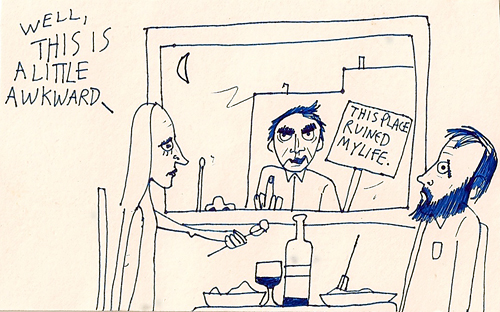The relationship between a restaurant and residents of the street on which it sits can easily be cracked -- not unlike the fragile shell of a mishandled farm egg. The issue surfaces most when the establishment becomes popular. As crowds come to consume, locals are forced to adjust to accommodate (or combat) the inevitable changes that arrive. I occasionally wonder how my life is shaped by the eateries around me. I enter and exit BART most days with the sweaty, steak-y scent of El Farolito's morning meats burrowing into my nostrils. Discarded McDonald's wrappers from the franchise on the corner float like pastel tumbleweeds past the front door of my apartment. Beyond food, the same Latin rock band plays every Sunday all day at the 24th St. BART station. They do largely the same set every week. I have the guitar player's solos memorized, so if he's ever sick, I can fill in. The dance studio across the street, above the coffee shop, thumps and stomps most evenings. When I look out my window, I can sometimes see the tops of the dancers' heads bobbing into view. Last week, I recorded an interview over speaker-phone, and when I listened back to it yesterday, the rhythmic hums and drums from a block party happening just 50 yards away were etched on to the recordings like vuvuzela horns droning beneath ESPN's World Cup game broadcasts. Through smells, sounds, and sights, the city has its way with your senses -- and you either deal with it or you leave.
The problem gets especially thorny when the offended parties -- the light sleepers, neat freaks, and territorial denizens of the block -- feel as if they're a more intrinsic part of the city than the offender, particularly when the offender is a trendy, much-blogged, money-making food-service operation with a clientele neither reflective of nor rooted in the neighborhood -- and the offended happen to be long-time residents.
Recently, two local situations -- one major and one seemingly minor and more than a little absurd -- have drawn attention to a reoccurring scenario fraught with peril.
Last month, Mission Loc@l reported on a showdown at Schmidt's involving, not a dish of leathery braised rabbit or an ill-seasoned terrine, but an upstairs tenant with a bone to pick. Since May 2009, Patricia Kerman, a 14-year resident of the building, has complained about a noisy kitchen fan (which the restaurant's owner replaced), called a restaurant inspector, allegedly told customers she'd become ill after a meal there, posted a sign ("Bad Neighbors") in her window overlooking the front door, and retaliated with daily thumps and bumps that rattle the ceiling. Whew. The landlord doesn't want to be involved; the police can do little, even though Schmidt's has potentially lost business. Other neighbors don't support Kerman's claim, but until both parties (meaning Kerman as well as the Schmidt's crew) agree to mediation, the standoff continues.
